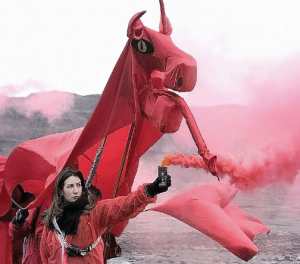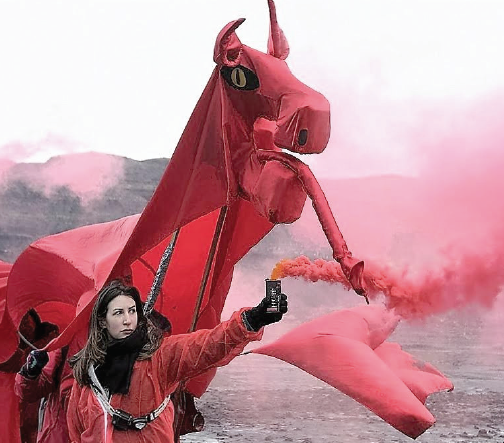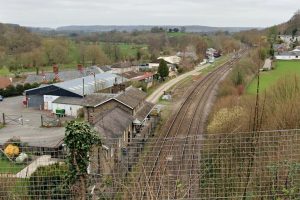
A DRAGON from Aberystwyth was in the forefront of the occupation of an opencast coalmine near Merthyr Tydfil last week.
Pictures of ‘y ddraig goch’ dominated days of intensive global media coverage of the action at the 11 million tonne Ffos-y-Frân mine.
The story first broke in the UK when The Herald previewed the occupation.
Inside the dragon were Mike Fincken from Aberystwyth and Ian O’Reilly from Lampeter.
On the eve of Assembly elections, they were taking part in the occupation to demand an end to coal because of the impact that burning fossil fuels has on climate change.
The occupation and a four-day camp was organised by Reclaim the Power (RtP). This network joined forces with local residents the United Valleys Action Group (UVAG) who have been opposing the mine because of its visual impact, dust and noise pollution since 2004.
Led by the dragon, more than threehundred people dressed in red boiler suits drew a line across the mine to symbolise that carbon emissions are exceeding viable limits for future life on Earth. Alternately singing, dancing and playing football, protesters nonviolently closed the mine for twelve hours. South Wales police made no arrests.
The RtP camp was an impressive feat of organisation. For four-days on a bitterly cold hill-top three-hundred people made use of marquees and geodesic domes for meetings and workshops, enjoyed food prepared by chef from Cardiff, had all the energy they needed generated by a small wind turbine and an array of photovoltaic panels, and made use of commodious and virtually odourless compost toilets.
Mike Fincken was most impressed with the food: “The only thing at this event that was better than the direct action we took was the food we ate, fresh, colourful, delicious and piping hot vegan cuisine.”
Why they did it
Ian O’Reilly told The Herald why he had been a part of the occupation: “Because I had heard of the struggles that the Ffos-y-Frân residents were facing before, but it wasn’t until I started looking at the pictures and reading about it that I realized just how big the destruction was, and how badly the people around there had been treated.
“I went to the Reclaim the Power Camp because I love the countryside, and we have to get out there and protect it – whether it’s outside the door or a couple of hours away. Otherwise big companies are going to keep on destroying it, leaving us with nothing.”
Mike Fincken told us why he was there: “To shut down the largest opencast coal mine in the UK. This was a local protest with an international audience. It was also the first action of Groundswell a series of international actions planned to increase the call for climate justice in 2016.
“Last year I was inspired by ‘Ende Gelände’ where fifteen hundred people occupied an open-cast mine in Germany. Ende Gelände had in turn been inspired by previous actions at Ffos-y-Frân.”
Best moment?
Mike Fincken recalls that his: “Best moment came when I was asked to be the head of the dragon. I was a little anxious that I would be strong enough to carry it off all day but I didn’t hesitate to accept the challenge.
“I did not expect that I would end up leading 300 people in serpentine fashion down into the deep centre of the mine!” For Ian O’Reilly: ‘All of my best moments were about people and that sense of community.
“Down in the centre of the mine, dancing with the dragon and singing with drummers and watching people play a game of football made me appreciate what we had managed to do: In halting a dangerous activity, we had also brought people together.”
Worst moment?
Ian and Mike were in agreement about their worst moment during the camp. Ian told The Herald that: “Waking up to find your tent covered with frost in May wasn’t pleasant, but I would have to say that my worst moment was seeing all the rubbish tipped out on the sides of the roads up near the common and Rhaslas Reservoir on the way to the camp.
“It was a really disheartening moment and sort of captured everything that we were there to try and turnaround.”
Mike added: “I was shocked by the mass of fly-tipped garbage at the side of the road outside of Merthyr Tydfil. Over the long weekend people from the camp made an effort to collect it.
“Office chairs, fenders, pipes, decaying bags filled with trash and a lot of rusty wire. We called the council to take it away but their truck wasn’t big enough and it had to do two runs.”
It is striking that, knowing about the climate change associated with coal and confronted by a filthy great hole in the ground covering 900 acres, Ian and Mike were most shocked by fly-tipping.
To obtain initial planning permission Ffos-y-Frân actually masqueraded as a land reclamation scheme. Merthyr common has long been a notorious site for fly-tipping. Despite a commitment from the developers of Ffos-y-Frân to clean it up, the practice continues unabated.
This in an area of potentially outstanding natural beauty on the edge of the Brecon Beacons, a renowned tourist destination. UVAG and RtP will revisit the common in June to organise a major clean-up.
What was achieved?
Mike told the Herald: “Three-hundred people took a dragon into UK’s largest opencast coal mine and shut it down. We achieved international coverage in the first wave of the Groundswell movement for 2016.
“For three days we were the top story in Wales. We brought protest home and showed that it is simple, fun and most importantly that it is carried out by ordinary people. Last year was the hottest on record.
“Climate change is talked about on an academic level, but in direct action there is the opportunity for ordinary people like myself to do something about it.”
Ian added: “I’d like to think that somehow we managed to reach the workers we saw and met. That maybe they appreciated that we were doing this for them, their families and their jobs.”
The politics of coal
With Aberthaw power station, the main market for coal from Ffos-y-Frân on its last legs, the end of opencast mining in Wales may not be so far down the line.
Plaid Cymru is committed to no new opencast, while the Liberal Democrats and the Green Party both made election pledges to produce all the nation’s electricity from renewable sources.
Labour’s commitment is less quantifiable, with a vague manifesto pledge to develop more renewable energy projects. While the Conservatives are more sceptical on climate change, UKIP seeks to cut Welsh government spending on climate change altogether.
Only the Green Party found time to actively support the Reclaim the Power Camp as part of a busy election campaign. For all their efforts, they were rewarded by gaining no seats in the Assembly.
Party leader Natalie Bennet visited the camp together with Wales leader Alice Hooker-Stroud, who said: “Fossil fuels must stay in the ground if we’re to act responsibly on climate change. We don’t need or want more opencast in Wales.
“There is huge potential for renewables in Wales, creating a clean energy economy fit for the future. Not only is the industry potentially worth billions to the Welsh economy, which could be invested by communities and local authorities in public services, but it would provide decent, sustainable jobs across Wales.”













Add Comment